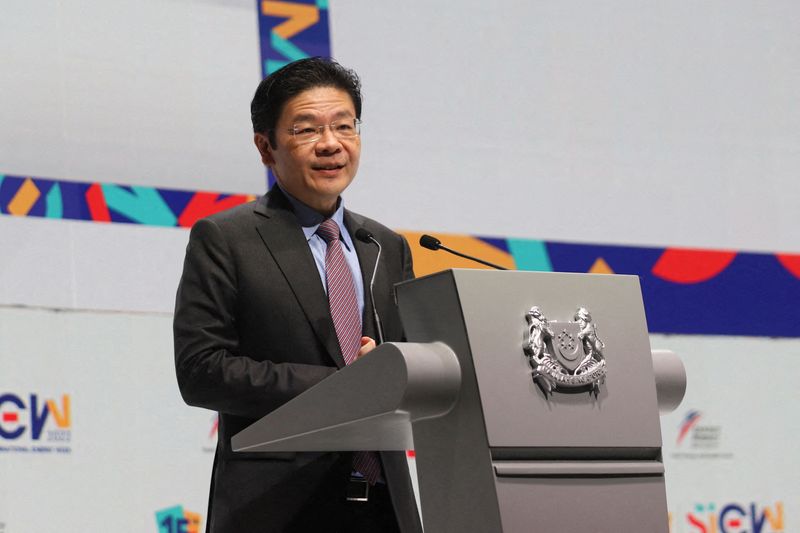
©Reuters. FILE PHOTO: Singapore Deputy Prime Minister and Finance Minister Lawrence Wong holds the Singapore Energy Lecture during the 15th Singapore International Energy Week, in Singapore October 25, 2022. REUTERS/Isabel Kua/file Photo
By Xinghui Kok and Joe Brock
SINGAPORE (Reuters) – (This Feb 16 story has been corrected to say S$6 billion in sales tax relief funding instead of the S$6 billion in vouchers in paragraph 9, and clarifies that S$1 billion over five years is for AI industry and talent development in paragraph 14)
Singapore Finance Minister Lawrence Wong announced a “significant adjustment” to the tax system on Friday with the implementation of the Organization for Economic Co-operation and Development (OECD)-led global minimum corporate tax rate of 15% .
The incumbent prime minister has also expanded government spending to help families fight inflationary pressures in the city-state and to grow the economy and jobs.
Wong told parliament the tax adjustment could lead to a narrowing of the tax base as multinationals reassess their plans and said he did not expect the move to generate revenue gains for Singapore.
OCBC economist Selena Ling called the move “quite disappointing” but said the trade-dependent economy has no choice as more countries – key markets for trade and investment – are implementing the minimum tax rate OECD corporate tax.
Wong announced a small overall surplus of S$0.8 billion or 0.1% of GDP for fiscal 2024, “essentially a balanced fiscal position,” he said.
The government’s medium-term fiscal stance is restrictive, but its overall stance is “appropriate as we are providing targeted support,” Wong said.
“Our key priority is to ensure a strong, innovative and vibrant economy.”
Support for families in one of the world’s most expensive countries would be supplemented with another S$1.9 billion ($1.41 billion), while a support package of S$1.3 billion would also be introduced for businesses, including a corporate income tax rebate of up to S$40,000. .
The population of 5.9 million also has to deal with sales tax increases that began last year and an upcoming scheduled increase in water rates. Wong announced a $6 billion top-up to a fund to help Singaporeans cope with rising sales taxes.
Inflation in Singapore has fallen from a peak of 5.5% early last year but remains above pre-pandemic levels of 3.3% in December.
“The best way to tackle inflation is to ensure that businesses and workers are more productive and that real incomes rise,” he said.
Wong said his goal is growth of between 2% and 3% each year over the next decade “focusing on productivity and innovation.”
Singapore expects higher GDP growth of between 1% and 3% this year, after slumping from 3.8% in 2022 to 1.1% in 2023.
A new tax credit would be created to support high-value economic activity, manufacturing, research and development, and the green transition, and $3 billion would be added to a research and development fund, as well as $1 billion over five years for development of artificial intelligence talent and industry.
The government will also spend an additional $300 million per year on health support for the aging population, which is expected to bring overall spending to 20% of GDP by 2030 from the current 18%.
Wong also announced a new energy transition fund, with an initial injection of $5 billion.
TAX CHALLENGE
Wong said he will push ahead with the implementation of the second pillar of BEPS 2.0, an OECD blueprint under which more than 140 countries have agreed to raise the minimum effective tax rate of large businesses to 15%.
But it was unclear what additional revenue they would produce and how long they would last in a country that has long been attractive to investors because of its low tax rates.
“We may also see a reduction in our tax base if multinationals move some of their operations to other jurisdictions,” he said.
In Singapore, the current prime rate is 17%, but some investors pay an effective rate of up to 4%.
Ling, the OCBC economist, said this would level the playing field for countries and it remains to be seen how multinational companies will react.
“Singapore has never competed on cost or tax basis alone,” he said.
Wong said Singapore was unapologetic for pursuing growth, but that the government would not push for economic expansion at all costs due to constraints on labour, land and carbon.
Singapore, he said, will be “an economy that benefits the many rather than the few.”
($1 = 1.3457 Singapore dollars)